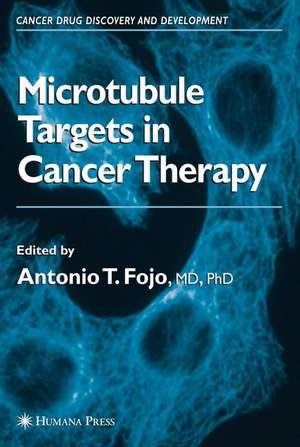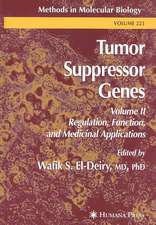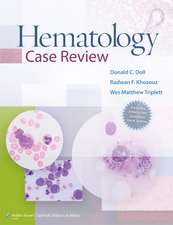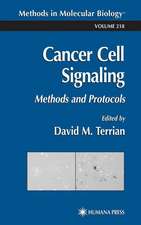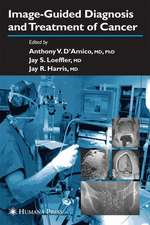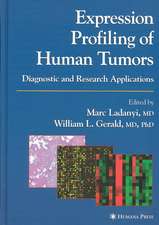The Role of Microtubules in Cell Biology, Neurobiology, and Oncology: Cancer Drug Discovery and Development
Editat de Antonio Tito Fojoen Limba Engleză Hardback – 11 iun 2008
| Toate formatele și edițiile | Preț | Express |
|---|---|---|
| Paperback (1) | 1436.94 lei 6-8 săpt. | |
| Humana Press Inc. – 3 noi 2014 | 1436.94 lei 6-8 săpt. | |
| Hardback (1) | 1388.89 lei 38-44 zile | |
| Humana Press Inc. – 11 iun 2008 | 1388.89 lei 38-44 zile |
Din seria Cancer Drug Discovery and Development
- 5%
 Preț: 1474.98 lei
Preț: 1474.98 lei - 5%
 Preț: 1108.35 lei
Preț: 1108.35 lei - 5%
 Preț: 1415.75 lei
Preț: 1415.75 lei - 5%
 Preț: 1370.19 lei
Preț: 1370.19 lei - 5%
 Preț: 1452.28 lei
Preț: 1452.28 lei - 5%
 Preț: 1316.74 lei
Preț: 1316.74 lei - 5%
 Preț: 1439.50 lei
Preț: 1439.50 lei - 5%
 Preț: 1113.63 lei
Preț: 1113.63 lei - 5%
 Preț: 1126.24 lei
Preț: 1126.24 lei - 24%
 Preț: 1037.59 lei
Preț: 1037.59 lei - 5%
 Preț: 1466.37 lei
Preț: 1466.37 lei - 5%
 Preț: 1350.78 lei
Preț: 1350.78 lei - 5%
 Preț: 1417.54 lei
Preț: 1417.54 lei - 5%
 Preț: 1113.46 lei
Preț: 1113.46 lei - 5%
 Preț: 1428.54 lei
Preț: 1428.54 lei - 5%
 Preț: 1429.80 lei
Preț: 1429.80 lei - 5%
 Preț: 782.10 lei
Preț: 782.10 lei - 5%
 Preț: 1438.58 lei
Preț: 1438.58 lei - 5%
 Preț: 1110.32 lei
Preț: 1110.32 lei - 5%
 Preț: 1434.39 lei
Preț: 1434.39 lei - 5%
 Preț: 1365.82 lei
Preț: 1365.82 lei - 5%
 Preț: 1461.08 lei
Preț: 1461.08 lei - 5%
 Preț: 1106.86 lei
Preț: 1106.86 lei - 5%
 Preț: 982.18 lei
Preț: 982.18 lei - 5%
 Preț: 727.80 lei
Preț: 727.80 lei - 5%
 Preț: 1331.76 lei
Preț: 1331.76 lei - 5%
 Preț: 1297.40 lei
Preț: 1297.40 lei - 5%
 Preț: 1124.59 lei
Preț: 1124.59 lei - 5%
 Preț: 1433.10 lei
Preț: 1433.10 lei - 5%
 Preț: 1110.90 lei
Preț: 1110.90 lei - 5%
 Preț: 1317.76 lei
Preț: 1317.76 lei - 5%
 Preț: 1464.91 lei
Preț: 1464.91 lei - 5%
 Preț: 1939.63 lei
Preț: 1939.63 lei - 5%
 Preț: 1418.48 lei
Preț: 1418.48 lei - 5%
 Preț: 1438.94 lei
Preț: 1438.94 lei - 5%
 Preț: 1100.30 lei
Preț: 1100.30 lei - 5%
 Preț: 1109.96 lei
Preț: 1109.96 lei - 5%
 Preț: 990.58 lei
Preț: 990.58 lei - 5%
 Preț: 1443.13 lei
Preț: 1443.13 lei - 5%
 Preț: 1428.91 lei
Preț: 1428.91 lei - 5%
 Preț: 787.58 lei
Preț: 787.58 lei - 5%
 Preț: 1311.72 lei
Preț: 1311.72 lei - 5%
 Preț: 1331.76 lei
Preț: 1331.76 lei - 5%
 Preț: 1113.11 lei
Preț: 1113.11 lei - 5%
 Preț: 1440.76 lei
Preț: 1440.76 lei
Preț: 1388.89 lei
Preț vechi: 1461.99 lei
-5% Nou
Puncte Express: 2083
Preț estimativ în valută:
265.76€ • 278.26$ • 220.43£
265.76€ • 278.26$ • 220.43£
Carte tipărită la comandă
Livrare economică 05-11 aprilie
Preluare comenzi: 021 569.72.76
Specificații
ISBN-13: 9781588292940
ISBN-10: 1588292940
Pagini: 690
Ilustrații: XVII, 587 p.
Dimensiuni: 178 x 254 x 35 mm
Greutate: 1.68 kg
Ediția:2008
Editura: Humana Press Inc.
Colecția Humana
Seria Cancer Drug Discovery and Development
Locul publicării:Totowa, NJ, United States
ISBN-10: 1588292940
Pagini: 690
Ilustrații: XVII, 587 p.
Dimensiuni: 178 x 254 x 35 mm
Greutate: 1.68 kg
Ediția:2008
Editura: Humana Press Inc.
Colecția Humana
Seria Cancer Drug Discovery and Development
Locul publicării:Totowa, NJ, United States
Public țintă
ResearchCuprins
An Overview of Compounds That Interact with Tubulin and Their Effects on Microtubule Assembly.- Molecular Mechanisms of Microtubule Acting Cancer Drugs.- Microtubule Dynamics.- Microtubule-Associated Proteins and Microtubule-Interacting Proteins.- The Post-Translational Modifications of Tubulin.- The Isotypes of Tubulin.- The Tubulin Superfamily.- Tubulin Proteomics in Cancer.- Tubulin and Microtubule Structures.- Destabilizing Agents.- Molecular Features of the Interaction of Colchicine and Related Structures with Tubulin.- Antimicrotubule Agents That Bind Covalently to Tubulin.- Microtubule Stabilizing Agents.- Mechanisms of Resistance to Drugs That Interfere with Microtubule Assembly.- Resistance to Microtubule-Targeting Drugs.- Microtubule Stabilizing Agents in Clinical Oncology.- Investigational Anticancer Agents Targeting the Microtubule.- Microtubule Damaging Agents and Apoptosis.- Microtubule Targeting Agents and the Tumor Vasculature.- Neurodegenerative Diseases.- Structure, Function, and Regulation of the Microtubule Associated Protein Tau.
Recenzii
From the reviews:
"This book is appropriate for laboratories with an interest in the biology of microtubules … . Each chapter is nicely illustrated, well referenced, and offers a timely evaluation of what is known about tubulin and microtubules, including how they are targeted therapeutically. … The color insert and the accompanying CD-ROM with all color figures are helpful. This is an excellent all-around reference appropriate for researchers or clinicians interested in the basic science of tubulins, microtubules, related diseases, and targeted therapy."(John D. Robertson, Doody’s Review Service, January, 2009)
“This book offers a wide and detailed discussion of drugs and methods for studying tubulins and microtubules … . The book is easy-reading and well organized by … well-detailed and itemized methodology of study, a helpful conclusion including tips for future interested investigators, and a long list of references serving a specific source of search. … Chapters added in the end of the book … very nicely wrap up the book for those interested in these areas and hopefully intending to acquire acknowledgement about it.” (Fábio Luís Forti, Brazilian Journal of Pharmaceutical Sciences, Vol. 47 (2), Summer, 2011)
"This book is appropriate for laboratories with an interest in the biology of microtubules … . Each chapter is nicely illustrated, well referenced, and offers a timely evaluation of what is known about tubulin and microtubules, including how they are targeted therapeutically. … The color insert and the accompanying CD-ROM with all color figures are helpful. This is an excellent all-around reference appropriate for researchers or clinicians interested in the basic science of tubulins, microtubules, related diseases, and targeted therapy."(John D. Robertson, Doody’s Review Service, January, 2009)
“This book offers a wide and detailed discussion of drugs and methods for studying tubulins and microtubules … . The book is easy-reading and well organized by … well-detailed and itemized methodology of study, a helpful conclusion including tips for future interested investigators, and a long list of references serving a specific source of search. … Chapters added in the end of the book … very nicely wrap up the book for those interested in these areas and hopefully intending to acquire acknowledgement about it.” (Fábio Luís Forti, Brazilian Journal of Pharmaceutical Sciences, Vol. 47 (2), Summer, 2011)
Textul de pe ultima copertă
The family of proteins called the tubulin and the microtubules they form when they aggregate are extremely important in the cell and, as we are increasingly learning, important in diseases that afflict so many. This field of investigation is a testament to how important both basic and clinical sciences are in understanding disease mechanisms and making inroads into therapies. Microtubule Targets in Cancer Therapy presents the first comprehensive exploration of the dynamic potential of microtubules anti-cancer targets. Written by leading anti-cancer researchers, this groundbreaking volume collects the most current microtubule research available. Among the topics examined in this volume are compounds that interact with tubulin, mechanisms and regulation by microtubule-associated proteins and drugs, MAPs, the tubulin superfamily its isotopes, peptides and depsipeptides, and neurodegenerative diseases.
Without the basic scientific knowledge that has been accumulated – to which the contributors of this work have contributed greatly – we would not be in the position we find ourselves as we increasingly understand disease and advancing therapies. Microtubule Targets in Cancer Therapy contributes to this new knowledge, and the text will be an invaluable resource for cancer researchers, oncologists, pharmacologists, and medical chemists.
Without the basic scientific knowledge that has been accumulated – to which the contributors of this work have contributed greatly – we would not be in the position we find ourselves as we increasingly understand disease and advancing therapies. Microtubule Targets in Cancer Therapy contributes to this new knowledge, and the text will be an invaluable resource for cancer researchers, oncologists, pharmacologists, and medical chemists.
Caracteristici
Collects the most current microtubule research available Investigates the potential of microtubules in cancer therapy Written by leading anti-cancer researchers
